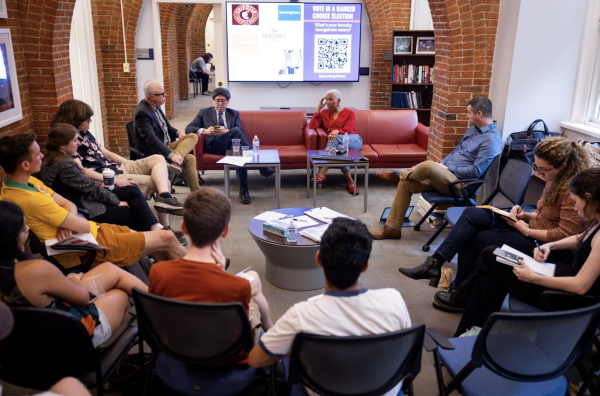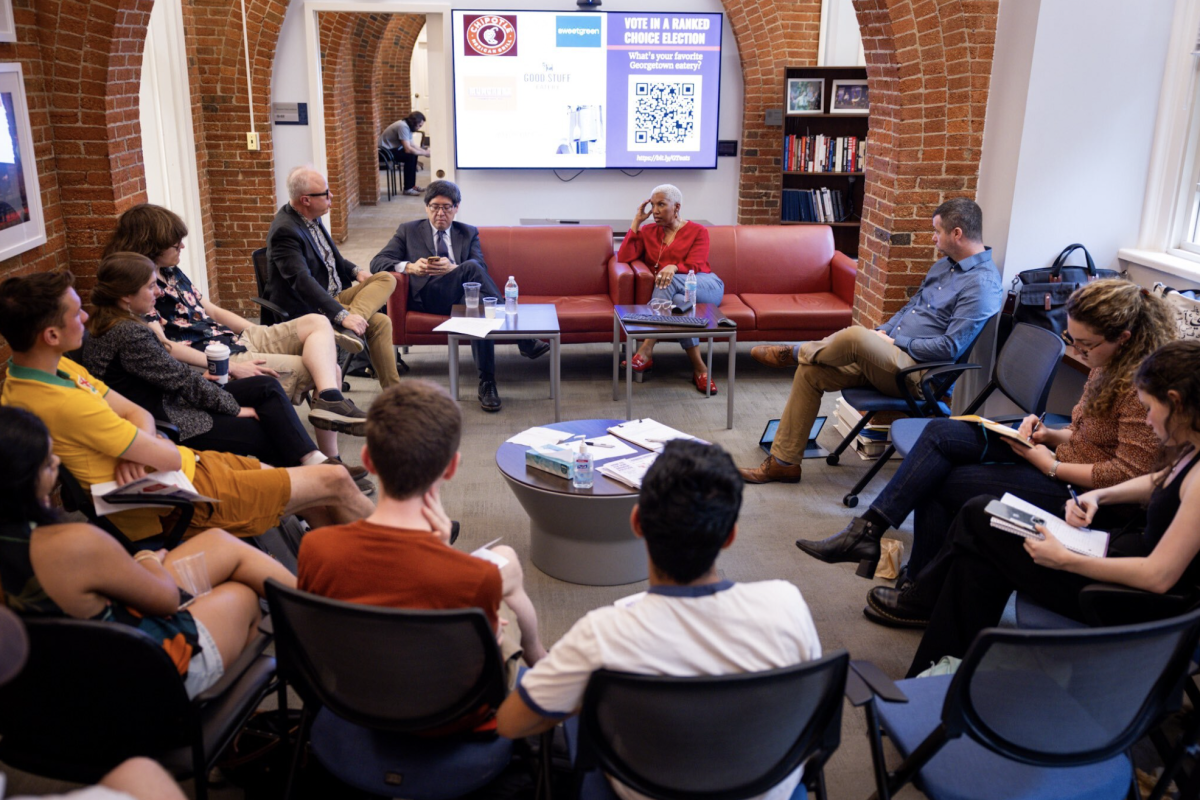Panelists argued ranked-choice voting produces more democratic elections and decreases polarization and apathy in a Georgetown University Institute of Politics and Public Service (GU Politics) event April 17.
David Daley, a senior fellow at FairVote, a national organization that advocates for democratic election reform, moderated the panel, titled “How to Fix Our Broken Politics,” which GU Politics hosted in collaboration with FairVote. Speakers included Sam Wang, a professor of neuroscience at Princeton University and Lisa D.T. Rice, a D.C. Advisory Neighborhood Commissioner.
Rice proposed Initiative 83 to implement ranked-choice voting in Washington, D.C., a ballot initiative that may appear on D.C. voters’ ballots this November. If passed, ranked-choice voting would be implemented beginning in 2026.
Rice said bringing ranked-choice voting to the District would yield election outcomes where candidates are elected by a majority of voters rather than a plurality, in which the candidate who does not have an absolute majority but has the highest number of votes wins.
“What does ranked-choice voting do for you? It delivers elected officials who have been put in office with 50% plus one of the vote,” Rice said at the event. “As Washingtonians, what that means is we will actually have a council and a mayor who have been elected by the majority.”
Since D.C. has a heavily Democratic-leaning electorate, the Democratic primary elections often decide who will ultimately hold office in city-wide races. Councilmember Anita Bonds was elected to the D.C. City Council in 2022 after receiving only 36.1% of the primary vote.
Rice said that under the current electoral system, candidates who win a small percent of the primary vote are often elected in general elections.
“Right now, sitting on our council, only three council members won with more than 50% of the vote in the primary. So, the majority of our council is sitting there, having won the primary with about, 30, 35%. It’s just crazy. It’s absolutely nuts,” Rice said.

Wang, who is the founding director of the Princeton Electoral Innovation Lab, which produces empirical models and resources used to support democracy reform efforts, said he believes that implementing ranked-choice voting throughout the country would structurally curtail polarization and political breakdown.
“If you are in one political party, it is in your interest to make sure that the general election opponent you face is as extreme as possible,” Wang said at the event. “Ranked-choice voting, it’s an experiment that replaces those incentives with incentives to help people form a majority consensus and work for one another’s support.”
Rice, who is a registered Independent, also stressed the importance of having open primaries in D.C. and said elections should be decided by all voters, rather than just voters registered under one of the two major parties.
“One in six D.C. voters are independents. I’m one of them,” Rice said at the event. “We are not affiliated with any party. Our taxpayer-funded elections should be open for everyone to be able to vote. That’s simple.”
Wang said that if ranked-choice voting is implemented, candidates would try to appeal to a broader electorate who may be interested in ranking them as a second or third choice when running for office.
“Rank choice voting creates an incentive to build consensus and to campaign for your opponents’ supporters,” Wang said.
Rice said that when in office, officials elected via ranked-choice voting would have to be attentive to a wider range of supportive constituents.
“If we had ranked-choice voting, people would really have a chance to vote for their favorite. When they rank their backups they still would feel, at the end of the day, ‘my person is in office.’ And it makes those who win understand that they are accountable to those people,” Rice said.
Rice added that she is taking action to implement ranked-choice voting to strengthen democracy for future generations.
“I want a democracy. I want to be able to say to my grandchildren, ‘I did something about helping us get through this time,’” Rice said.















